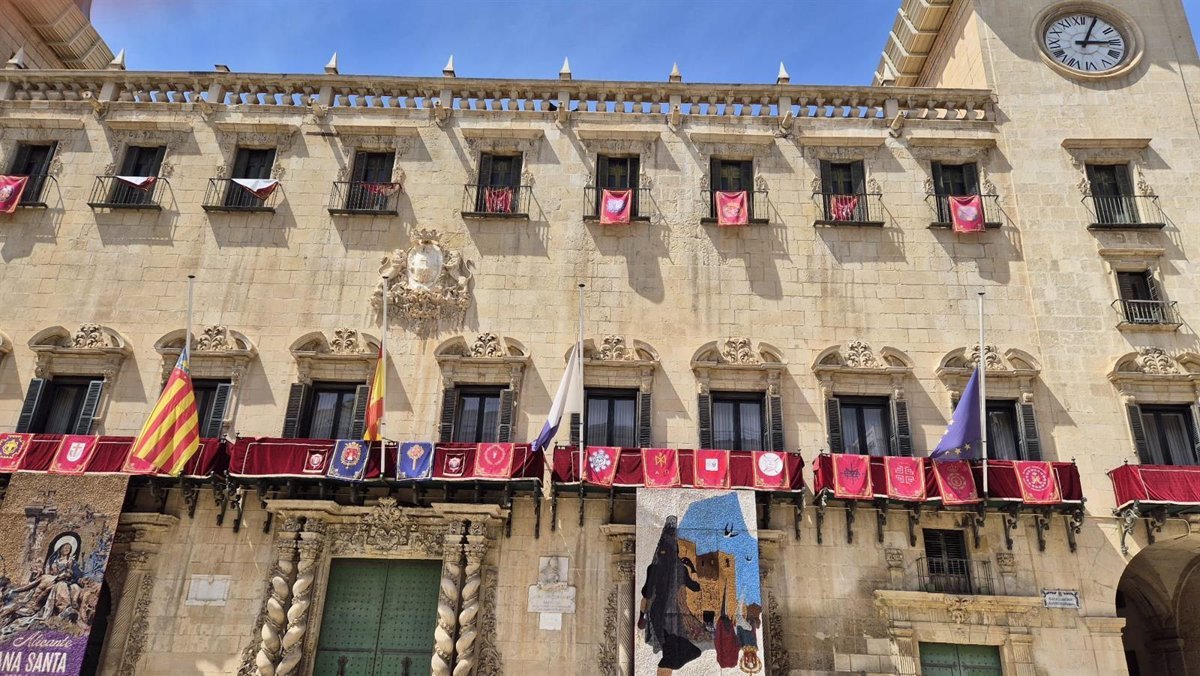
The City Council meets at MARQ extraordinarily with the occasion of the exhibition «Cities of Light. Ákra Leuké, Lucentum, Laqant» about the origin of Alicante
The Governing Board agrees to withdraw this distinction following the explicit recognition by the Augustinian Community of the behavior of this gentleman linked to abuses
Alicante, April 15, 2025. The City Council of Alicante has decided this Tuesday in the Governing Board to change the name of the public road ‘Avenida Padre Ángel Escapa’ to ‘Avenida Torres de la Huerta’. The decision comes after the explicit recognition by the Augustinian Community of the behavior of this gentleman linked to abuses, and the artery adopts a new name related to the historical enclave where defensive structures from the 16th and 17th centuries erected by Alicante families against pirate attacks proliferate.
The weekly session of the municipal government body was held extraordinarily at the Provincial Archaeological Museum of Alicante, MARQ, on the occasion of the exhibition «Cities of Light. Ákra Leuké, Lucentum, Laqant» about the origin of Alicante.
In the agreement adopted for the name change of this artery in Albufereta, as reported by municipal spokespersons Cristina Cutanda and Manuel Villar, it is stated that «until now there was a public road in Alicante named Avenida Padre Ángel Escapa, but following the explicit recognition by the Augustinian Community of the behavior of this gentleman linked to abuses, it has been decided to remove from Alicante’s map «someone who, due to his conduct and behavior, has not proven to be deserving of this distinction».
«The conduct of those who are publicly recognized by the people of Alicante with a space or public road must remain impeccable in every sense, and that recognition is incompatible in this case with socially reprehensible behaviors that generate alarm. Therefore, this public road located in the Albufereta area is now named «Torres de la Huerta,» concludes the statement.
Historical enclave
The Torres de la Huerta were built during the 16th and 17th centuries in the so-called Alicante orchard, a portion of land located northeast of the city of Alicante, irrigated by the waters of the Tibi reservoir through a complex system of irrigation channels and dedicated to vine cultivation.
To mitigate the attacks of pirates attracted by wealth, a defensive system was developed to detect the presence of hostile ships through a network of watchtowers on the coast, allowing for quick notification from one tower to another and nearby populations.
With this decision, the Municipal Statistics Department is tasked with processing the documentation for the acquisition of the necessary plaques to label the public space to which, by virtue of this agreement, an official name has been assigned.
Exhibition on the origin of Alicante
The Local Government Board has moved from the City Council to the Provincial Archaeological Museum (MARQ) this Tuesday for the exhibition «Cities of Light. Ákra Leuké, Lucentum, Laqant» on the origin of Alicante. The exhibition includes 25 archaeological pieces from the collections of the Museum of the City of Alicante (MUSA) loaned for this temporary exhibition. Due to the successful attendance since its opening on December 20 until April 13, with 22,827 visitors, the museum’s management has decided to extend the exhibition until September 7, 202.
The municipal government has chosen to hold the Governing Board at MARQ as a tribute to the city’s history, reflected in this exhibition where a journey through the ancient cities that developed around the Tossal de Manises site that gave rise to Alicante: Ákra Leuké, Lucentum, and Laqant.
MARQ Anniversary
In 2027, the 95th anniversary of the Provincial Archaeological Museum of Alicante will be celebrated (since its inauguration in January 1932 by D. Niceto Alcalá Zamora, President of the Second Spanish Republic, on the ground floor of the Alicante Provincial Council Palace), and the 25th anniversary of the inauguration of MARQ by H.M. Queen Sofía, in May 2002, in its current location in Plaza del Doctor Gómez Ulla in Alicante.
The mayor emphasized at the start of the Governing Board that its celebration at MARQ represents recognition of the extraordinary work carried out by this museum since its founding for the conservation and dissemination of the city’s history, which is part of our identity. Barcala also highlighted the importance of the current exhibition ‘Cities of Light’ as a thoroughly documented journey through the city’s past.
The CV Marque Foundation was established in 2001 by the founding trustees, including the City Council of Alicante, along with the Provincial Council, Generalitat, Caja de Ahorros del Mediterráneo, and Caja Murcia. Over the years, MARQ has become a national and international reference museum, being recognized as the Best European Museum of the Year in 2004 and awarded the DASA Avard by the European Museum Academy in 2024 for projects in didactics, education, and social responsibility.
Over the years, the City Council of Alicante has maintained an active collaboration with MARQ in various activities and exhibitions. The most recent collaboration focuses on the development of the Interpretation Center of the Torres de la Huera in Torre Sarrió, which has been rehabilitated for this purpose with the collaboration of MARQ and City Council technicians, and its museumization is currently in the tendering and execution phase.






